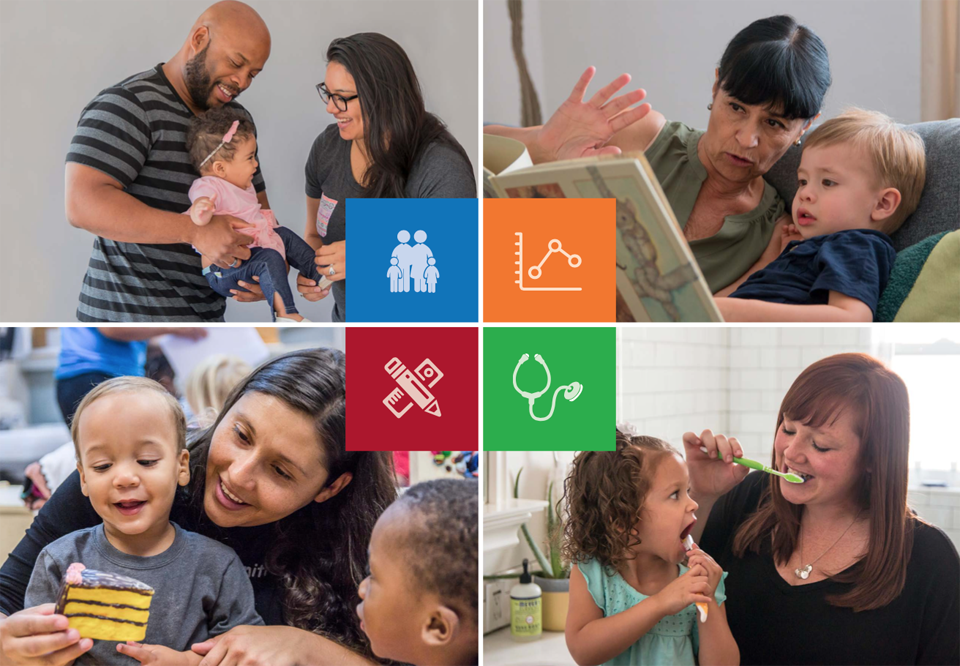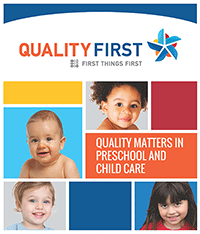Welcome to the First Things First Data Center
Intended Use

Investments
Data related to the amounts allotted, awarded and expended per FTF goal area and strategy, both statewide and by FTF region.
The total amount allocated to each regional council is based on the number of children birth through age 5 in that region, with extra consideration given for the percentage of young children living in poverty. Through strategic planning with their community, each regional council then determines early childhood strategies to fund in the region and the amounts allotted to those strategies.
Allotted is the amount the statewide Board and/or the regional partnership councils have budgeted to spend on any given strategy in the fiscal year. Awarded is the amount FTF has made available, through a contract, to an organization(s) for them to provide services under the strategy either through existing FTF staff, contracts with community agencies or agreements with other government organizations. Expended is the total amount spent to date.

Grant Partners
Data pertaining to grant partners awarded funding by First Things First regional partnership councils, by region and strategy, including the amount awarded to each. Note that there may be more than one grant partner servicing a strategy within a region.
A grant partner is an entity which has received a grant award from FTF. Grant partners include non-profit, governmental, tribal, private and charitable organizations. Grant awards are made through a competitive process, (except in certain instances in which FTF has entered into an agreement with another governmental organization for specified programs or services related to FTF strategies).
Service Units
For each FTF region and every FTF strategy, data on targeted service units (TSU), contracted service units (CSU) and actual service units (ASU).
Service units are how FTF tracks the performance of each strategy and can be related to a specific population to be served (e.g., adults participating in parent education class) or a service/product to be delivered (e.g., fluoride varnishes applied to children ages 0-5, books distributed, etc.) by FTF’s contracted grantees. The required targeted/contracted service units are determined by regional councils and are specific to each strategy within a region. Actual service units are reported by FTF grantees on a quarterly basis.
For more information on service units and other information pertinent for each strategy, please visit the FTF Strategy Toolkit.
Quality First
By FTF region and statewide, data related to child care and preschool providers participating in or eligible for Quality First, including number of children enrolled, number of children with special needs enrolled, Quality First Scholarships awarded, and Quality First Star Ratings.
Quality First, a signature strategy of First Things First, partners with child care and preschool providers to improve the quality of early learning across Arizona. Quality First Star Ratings are based on valid and reliable assessment tools focused on what research shows are the key components of quality early care and education that help children thrive. To learn more, visit QualityFirstAZ.com

Demographics
From the US Census Bureau, statewide and regional data related to Arizona children and families, including:
- Population / Poverty
- Income
- Employment
- Family Arrangements
- Education
- Health
This information helps provide a clearer understanding of the state of Arizona’s children. In addition, child population and poverty levels are primary factors considered in regional funding decisions.
Other Data Resources
Read On Arizona, of which First Things First is a founding partner, worked with Maricopa Association of Governments to create this interactive mapping tool as a resource to identify key data sets (census, school, health, family engagement) that impact early literacy outcomes in communities. MapLIT presents graphic views of select data for all Arizona public/charter elementary school and preschool site locations. Its intended use is to support strategic planning to improve language and literacy outcomes for all Read On Arizona communities.

First Things First’s biennial Building Bright Futures report is a resource for those seeking to better understand the state of Arizona's children – both the challenges and opportunities. The 2019 State and County Data Sets is an online tool that supplements this report, providing access to detailed statewide and county-level data, where available, in four categories: Child Health and Well-Being, Economic Circumstances, Education, and Family Characteristics.


 Help
Help



